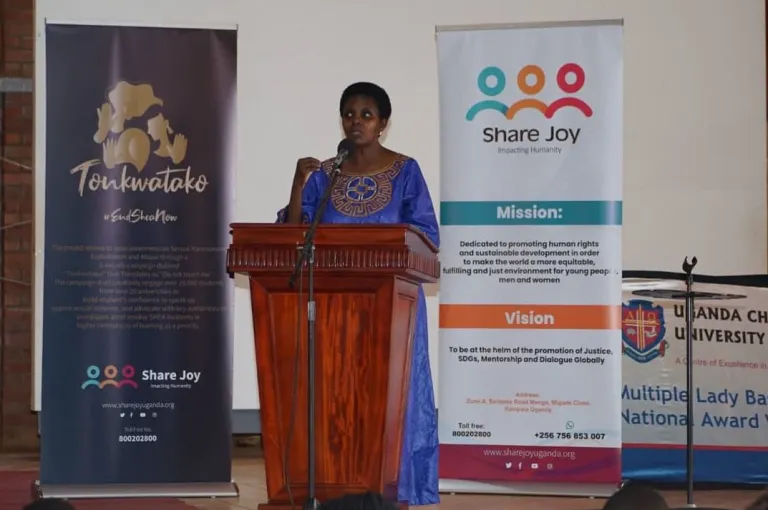By Pauline Luba
After hearing horrendous stories and experiences of friends who had faced sexual harassment, in February 2022, Brian Muhumuza birthed an organisation that he hoped would make lives of individuals like them better. In Share Joy International, a non-governmental organization, Muhumuza, the organization’s Executive Director, believed he had a tool to help confront such social injustices.
Using the platform of Share Joy International, on March 8 in UCU’s main campus Nkoyoyo Hall, Muhumuza and Lubanga Nasser, both students at Uganda Christian University (UCU), launched a campaign against sexual violence. The non-profit organisation defines sexual harassment as involving “the use of explicit or implicit sexual overtones, including the unwelcome and inappropriate promises of rewards in exchange for sexual favors” and a range of actions from “verbal transgressions to sexual abuse or assault.”
The launch of the campaign named Tonkwatako, End Sexual Harassment, Exploitation and Abuse was organized by Muhumuza and Lubanga under the theme “Building Safe and Inclusive Space: Combating Sexual Harassment and Abuse,” The campaign is intended to create awareness about the dangers of sexual harassment in an institution like UCU. Part of the launch ceremony involved a panel discussion of the dangers of sexual harassment to the victims.
“We are calling upon parents, guardians and administrators to fight and take part in ending sexual harassment for all,” Lubanga, the programs manager at Share Joy International, said during the launch of the campaign.

Muhumuza and Lubanga said they organized the campaign after an online survey among 700 students of UCU indicated that a majority of them had faced sexual harassment. In the survey, according to Lubanga, 70.5% of the respondents said they had encountered sexual harassment from student colleagues with 14.3% from their guardians and 10.5% from their employers. Lubanga said they were shocked to learn that even some staff members had said they had faced sexual harassment from students.
Government statistics indicate that one in five women in Uganda aged 15-49 years has experienced sexual violence, while for men, it is one in 12. Statistics for sexual harassment are not readily available as there is no formal way through which government registers such cases.
At the March 8 event, chief guest Mrs. Patience Mushengyezi, the wife of UCU Vice Chancellor Prof. Aaron Mushengyezi, said sexual harassment usually happens when there is a high power distance between two individuals. Those that have more power in a particular situation prey on those with less power, in terms of strength, money and position, Mrs. Mushengyezi explained.
The organizers of the campaign intend to take it beyond UCU. In fact, student leaders from other universities were invited to witness the launch of the campaign. The guild presidents of Makerere University Business School, Kamoga Bruno, Victoria University’s Carter Jorine and Ddumba Timothy of UCU were present.
During a virtual meeting with Uganda Partners, Lubanga explained that they were also formulating a policy that will detail a clear system of reporting sexual harassment, which they hope to present to administrations of different universities to be adopted.
According to the plan, each university will have its sexual harassment policy drafted by its own leaders who will also set up a confidential reporting system and designate members who will be trained on how to handle the issues that arise.
“Sometimes, people are scared to report cases of sexual harassment because of the power the other party holds,” Lubanga said, before explaining further: “but this policy will encourage more people to come forth and report cases of harassment.”
For now, Share Joy International is formulating survey tools, which they will use for conducting studies in other higher institutions of learning, to be able to know how widespread sexual harassment is in those universities.


